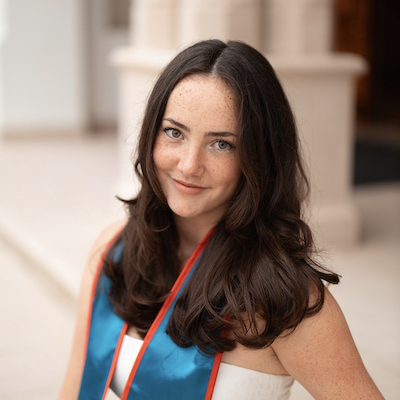
Sara Eberle ‘24
Major: Psychology
Minors: Statistics and Data Science, Health and Society
Next Step: Fellowship with Yale’s McPartland Lab
The neurodiverse people in Sara Eberle's life have inspired her to pursue a career in autism research. After graduation from LMU, Eberle will join the McPartland Lab at Yale for a two-year fellowship in the clinical neuroscience of autism.
Eberle chose LMU because of its size, values, and community. “I wanted to go to a university where I knew I would feel supported by both the faculty and the students, and I had a feeling that LMU would be that university,” said Eberle.
Due to the COVID-19 pandemic, Eberle spent her freshman year at LMU adapting to online classes. During her 'General Psychology' course with Visiting Assistant Professor Maria Pizzano, she discovered Associate Professor Alexandra Sturm’s research with autistic individuals. Driven by her passion, she promptly reached out to Sturm and has been actively involved in Sturm’s M3 lab ever since. “Dr. Sturm’s lab was my first introduction to an LMU community,” said Eberle.
Eberle’s first time on campus was in the summer of 2021 while participating in SURP, during which she supported the development of a new model to measure the social performance of autistic adults. She also contributed to developing a preliminary codebook for a study investigating the eating behaviors of autistic women. Eberle continued work on this study during SURP in the summer of 2023.
The M3 lab has been integral to Eberle’s growth as a student and a researcher. “I have learned how to coordinate studies, conduct literature reviews, code qualitative data, and mentor new lab members,” said Eberle. Professor Sturm has been the faculty advisor for Eberle’s psychology honors thesis as well, which examines the distinction between sensory pain and physical pain in autistic women, and is being prepared as a manuscript to be submitted for publication.
Eberle’s work with the M3 lab led to a clinical internship at the University of Washington Autism Center during the summer of her sophomore year. At UW, she learned how to work with autistic children to improve their social skills, self-esteem, and self-efficacy through naturalistic play. More recently, she has been working with a faculty member at UCLA who studies neurological differences in aging among autistic adults and with a faculty member at Ohio State University on a paper about the experiences of physical pain in autistic adults.
“I would not be where I am today without the mentorship from Professor Sturm,” said Eberle. “I came here as a freshman, eager and excited to participate in autism research. Since then, she has guided me throughout my undergraduate experience at LMU as a student and a researcher. I am incredibly grateful to have had the privilege to learn from her.”
Eberle also mentioned the incredible support she has received from Máire Ford, Vandana Thadani, and Negin Ghavami, noting that “the psychology research, funding, and mentorship were unmatched compared to other universities I considered.” She added, “Being a psychology major has helped me become a more sensitive and empathetic person.”
A love for psychology evolved into a passion for statistics. Eventually, Eberle added minors in Statistics and Data Science and Health and Society, giving her the ability to analyze quantitative data, and to think and reflect deeply on the data that she is working with. Eberle’s major and minors combination illustrates LMU’s emphasis on education and care for the whole person. “The more I have learned about the Jesuit mission, the more I have come to recognize and appreciate its values and how they are integrated into the curriculum and wider community,” said Eberle.
Eberle advises current BCLA students to appreciate the faculty. “LMU is unique in that you have small classes, opportunities for discussion and advising, and peers and faculty who genuinely want to see you succeed,” said Eberle. “Take advantage of this!”.
After her fellowship at Yale, Eberle plans to earn a Ph.D. in clinical psychology, focusing on the lifespan development and quality of life of autistic individuals.